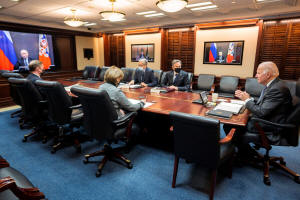|
"Bilateral relations are probably at their lowest point
historically, unfortunately," Kremlin spokesman Dmitry Peskov
told reporters.
"There is no hope for improvement in the foreseeable future."
Already poor U.S.-Russia ties became even more strained last
year when Russia invaded Ukraine, prompting Washington and its
allies to respond with a barrage of sanctions against Russia's
economy.
The United States has also provided Kyiv with substantial
economic and military support, drawing condemnation from Russian
officials who have accused Washington of playing a direct role
in the conflict.
While there have been occasional diplomatic successes, including
prisoner swaps involving U.S. Marine veteran Trevor Reed and
basketball star Brittney Griner, high-level contact has been
scarce.
U.S.-Russia talks on resuming inspections under the New START
nuclear arms limitation treaty were called off at the last
minute in November, while the Kremlin has played down the idea
of face-to-face talks between Biden and President Vladimir Putin
- who last met in person in Geneva in June 2021.
"The past two years have been, despite initial timid hopes
related to Geneva ... very bad for bilateral relations," Peskov
said.
The Kremlin has kept open the possibility of further talks
between Russia's foreign spy chief Sergei Naryshkin and U.S.
Central Intelligence Agency Director William Burns, who met in
Ankara in November.
(Reporting by Reuters; Writing by Caleb Davis; Editing by Kevin
Liffey)
[© 2023 Thomson Reuters. All rights
reserved.] Copyright 2022 Reuters. All rights reserved. This material may not be published,
broadcast, rewritten or redistributed.
Thompson Reuters is solely responsible for this content.

|
|




